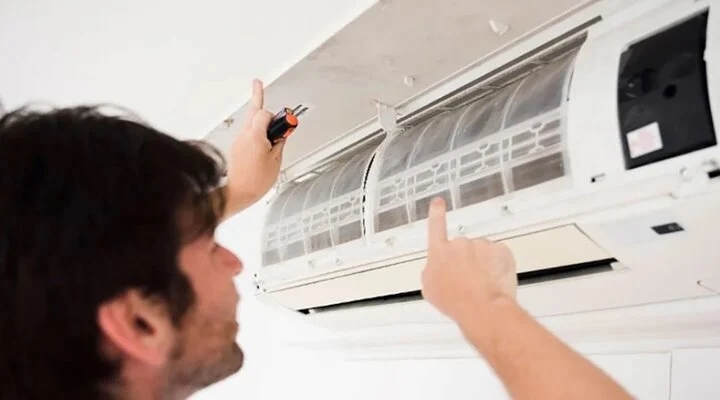During sweltering summer days, air conditioning becomes an indispensable companion for every family. Over time, many people encounter a situation where their AC emits an unpleasant odor, not only reducing air quality but also potentially affecting their health.
Why does air conditioning smell bad?
Air conditioners can emit bad odors due to various reasons, and the following are some common causes:
Accumulation of Dust and Bacteria
The air filter is an important component of the AC, responsible for filtering dust and bacteria from the air before it is cooled and blown out. Over time, the air filter can become clogged with dust and bacteria. If not cleaned regularly, these contaminants will accumulate, causing an unpleasant musty odor, which can affect the respiratory system.
The evaporator coils of the AC are also a place where dust and bacteria accumulate. Without regular cleaning, dust and mold will grow on the surface of the evaporator coils, producing an unpleasant odor. Moreover, the humid environment inside the evaporator coils provides an ideal condition for mold and bacteria to thrive, resulting in a musty, foul smell.

Why does your AC stink? (Image: Terrysacandheating)
Standing Water in the Drain Pan
The drain pan of the AC collects condensate water from the evaporator coils. If the drain pan is not cleaned regularly, the standing water creates an environment conducive to bacterial and mold growth, resulting in a foul odor. The stagnant water in the drain pan not only causes a bad smell but can also reduce the efficiency of the AC.
Clogged Drain Pipe
A clogged drain pipe in the AC will prevent water from draining properly, causing it to back up into the system. This situation not only leads to a foul odor but can also result in water leakage, damaging other components of the AC. When the drain pipe is clogged, you may notice a musty, putrid odor from bacteria and dirty water.
Humidity and High Moisture Levels
While ACs typically reduce humidity in the air, in some cases, the moisture levels in the room can still be too high, leading to condensation on the evaporator coils. This makes the coils damp, providing a breeding ground for bacteria and mold, resulting in a foul odor from the AC.
Consistently high moisture levels in the room can make the air feel damp and uncomfortable, and it can also pose health risks.
Refrigerant and Oil Leaks
Refrigerant is an essential part of the AC system, but if it leaks, it can emit an unpleasant chemical odor. Leaking refrigerant usually has a strong, unpleasant chemical smell.
Refrigerant leaks not only cause a foul odor but also reduce the cooling efficiency of the AC and can even damage the system.
Oil in the AC system lubricates moving parts. If the oil leaks or burns, it will produce a burnt or oily smell in the air, which can be harmful to health if inhaled over an extended period.
Dead Animals in the System
Small animals, such as mice or insects, may enter the AC system and die inside, causing a very unpleasant odor as their bodies decompose.
The smell from dead animals is usually strong and easy to recognize. This situation also poses health risks as it can spread bacteria and diseases.

The stinky AC smell can be fixed if you understand the cause. (Image: cielowigle)
Odors from Building Materials or Chemicals
If the AC system is installed in an area under construction or renovation, odors from paint, glue, or other building materials can be sucked into and dispersed through the AC. These chemical odors can be very unpleasant and may cause headaches and nausea.
Using strong chemical cleaners to clean the AC can also leave a foul odor if not rinsed properly. The smell of chemical cleaners is usually strong and unpleasant and can irritate the respiratory system.
Bacterial or Mold Infestation in the Ductwork
Dust and debris can accumulate in the ductwork over time, leading to a foul odor when air passes through these ducts.
Ductwork infested with bacteria or mold will disperse the unpleasant smell throughout the space when the AC is operating. The odor from infected ductwork is typically strong and can cause health issues such as allergies and respiratory inflammation.
Electrical Issues
Electrical problems with the AC system can cause a burning or acrid smell from melting wires or burning electronic components. This distinctive odor is easily recognizable. When encountering a burning smell, it is crucial to inspect and address the issue immediately to prevent fire hazards.
How to Get Rid of the Bad Smell from the AC
Now that you know why your AC smells bad, you can take preventive measures and address the issue by implementing the following steps:
Regular Cleaning: Clean the air filter, evaporator coils, drain pan, and drain pipe periodically. This helps remove accumulated dust, bacteria, and mold.
Inspection and Repairs: Regularly inspect the AC system to detect and fix issues such as refrigerant leaks, clogged drain pipes, or faulty electronic components.
Clean the Drainage System: Ensure that the drainage system is unclogged and functioning correctly.
Check for Gas Leaks: If you suspect a gas leak, call a technician to inspect and repair it.
Clean the Ductwork: Periodically clean the ductwork to remove dust and debris.
Use an Air Purifier: Place an air purifier in the room to reduce odors and improve air quality.
Maintain Appropriate Humidity: Use a dehumidifier if the room’s humidity is too high to minimize condensation on the evaporator coils.
Replace Components: Replace damaged or outdated parts to ensure the system operates efficiently and does not produce foul odors.
If the bad smell from the AC persists, contact professional cleaning and maintenance services for inspection and resolution. The stinky AC issue is common but can be resolved by understanding the causes and implementing proper cleaning and maintenance practices.
According to VTC news
































